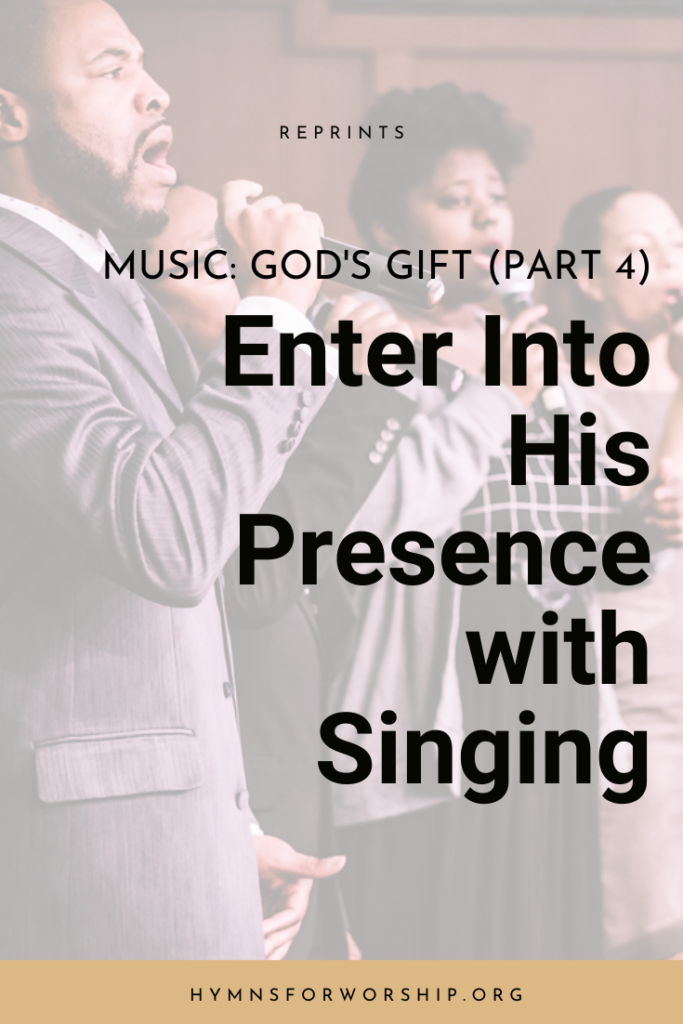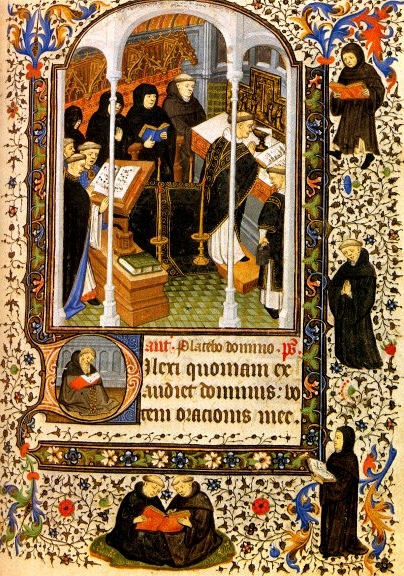The twin virtues of worship are prayer and praise. “The melody of praise is the atmosphere of heaven; and when heaven comes in touch with the earth, there is music and song, — ‘thanksgiving and the voice of melody’ (Isaiah 51:3)…As a part of religious service, singing is as much an act of worship as is prayer…Heaven’s communion begins on earth. We learn here the keynote of its praise.” Education, 161, 168.

Of the sixty-six books in the Bible, the largest is a wonderful collection of songs and psalms and hymns. “The choicest devotions of the ages are here — stairs shall we say, on which the saints of other ages ascended into the presence of God,” Roy Allan Anderson in March 1963 Ministry. Our hymnbook should be the best loved and best known of all the books of our library after the Bible and the Spirit of Prophecy writings. It is a rich treasure, a source of inspiration, a commentary on the life and experience of the church. Through it, we can trace the growth of spiritual concepts.

Medieval worship was characterized by a silent congregation. Each meaningful act of worship was performed for them, and their duty was to enter quietly, sit reverently, and depart after beholding a service that appealed to the eye and ear but had very little for the heart — a service in which they had no voice, but were spectators rather than participants.
The hymns we have in our hymnbooks are really the direct outgrowth of the Reformation. Congregational singing was as much a part of the Protestant Reformation as was doctrine. The reformers recognized praise as a vital part of spiritual growth. There is nothing more influential in making truth clear to people than to have them sing it.
Related Posts:
John Huss and Bohemia’s Reason To Sing
Protestant Reformation and 500 Years of Congregational Singing
“Hymns are sacred poetry set to music and sung in the course of public worship. They have always formed a part of Christian worship.” Oxford Dictionary of the Christian Church — Article on Hymns. Ephesians 5:19,20 (Moffatt): “Converse with one another in the music of psalms, in hymns and in songs of the spiritual life. Praise the Lord heartily with words and music. Render thanks to God the Father in the name of our Lord Jesus Christ at all times.”
In Christian hymn-singing, as a part of divine worship, we should aim to sing what we mean and mean what we sing. A church that sings in on fire spiritually. A church that doesn’t is dead or dying, for music is wings for the soul. It lifts the worshipper high above the trials and disciplines of life. The most important part of church music is the singing of hymns by the congregation.
Related Post: 10 Reasons Why Singing is a Part of Worship
“Music should have beauty, pathos, power. The singing is not always to be done by the few. As often as possible, let the entire congregation join in.” — Evangelism, 507. “The science of salvation is to be the burden of every sermon, the theme of every song.” Ibid., 502.
Congregational singing was as much a part of the Protestant Reformation as was doctrine. The reformers recognized praise as a vital part of spiritual growth. There is nothing more influential in making truth clear to people than to have them sing it.Click To TweetA choir is not a necessity in a church, but it may add much to the service if properly organized and directed. Its primary purpose is to lead the congregation in hymn-singing, and not to entertain the congregation. Their singing should be directed to God and not to the congregation.
Related Post: Do You Sing in a Church Choir? Hey, It’s Not Just All About Your Voice
The congregation should sing at least three hymns in every worship service. These should be carefully chosen. The first hymn should be of praise to God. The second should introduce the theme, while the third hymn should be the people’s response; an appeal hymn in which the congregation dedicates their lives to their Maker.
The Methodist Church, founded by the Wesley brothers, has always been known as a singing church. In 1777 they prepared a hymnal, the first of over 50 that their church has published. Charles Wesley wrote over 6,500 hymns, and the spirit which animated their evangelical fervor, had a great influence on bringing the missionary movement of the century into existence. Such is the power of song.
Related Post: Charles Wesley — Pastor, Poet and a Light Bearer
Our hymnbook should be the best loved and best known of all the books of our library after the Bible and the Spirit of Prophecy writings. It is a rich treasure, a source of inspiration, a commentary on the life and experience of the church. Through it, we can trace the growth of spiritual concepts. <em>-Dulcie Kitney</em>Click To Tweet
Here are John Wesley’s Directions to Singers:
“1. Sing ALL…Let not a slight degree of weakness hinder you. If it is a cross to you, take it up, and you will find it a blessing.
2. Sing LUSTILY and with a good courage. Beware of singing as if you are half dead, or half asleep, but lift up your voice with strength. Be no more afraid of your voice now, nor more ashamed of its being heard, than when you sing the songs of Satan.
3. Sing MODESTLY — strive to unite your voices together so as to make one clear melodious sound.
4. Sing IN TIME…and take care not to sing too slow. This drawing was naturally stolen on all who are lazy, and it is high time to drive it from among us, and sing all our tunes just as quick as we did at first.
5. Sing SPIRITUALLY. Have an eye to God in every word you sing! Attend strictly to the sense of what you sing, and see that your heart is not carried away with the sound, but offered to God continually.” Music and Worship, Walford Davies and Harvey Grace.
It is not so much technical excellence but the earnestness of spirit, the desire to develop a greater and more intimate fellowship between the worshipper and his God that we should seek for. In our song services let there be a theme which leads from hymn to hymn and ends in a definite climax so that there is some purpose fulfilled in our singing, and not just to fill in the time. “The song of praise, the prayer, the words spoken by Christ’s representatives, are God’s appointed agencies to prepare a people for the church above, for that loftier worship into which there can enter nothing that defileth.” Testimonies, vol. 5, 491.
It is not so much technical excellence but the earnestness of spirit, the desire to develop a greater and more intimate fellowship between the worshipper and his God that we should seek for.Click To TweetStudy your hymnbook more carefully. Note the dates, when and why the hymns were written. Read up on the lives of the composers and visualize the setting so that the hymns become alive and real to you with a deeper, hidden meaning than you have ever noticed before. As we sit in our pew, let us cultivate a passionate desire to experience the noble sentiments expressed in the countless grand hymns to be found in our hymnals. I believe that the office of music in Christian worship is a sacred oblation before our Most High God. “Let us worship the Lord in the beauty of holiness.”
The following article by Dulcie B. Kitney is taken from the July 15, 1969 issue of Trans-Africa Division Outlook.The original can be found at the Adventist Digital Library website.
Like this article? Share it!

